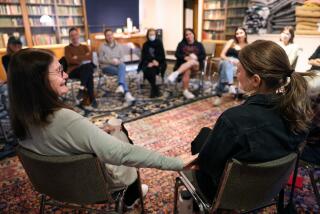Caitlin Doughty’s ‘Will My Cat Eat My Eyeballs?’ tackles taboo topics
- Share via
Mortician Caitlin Doughty is dead-set on changing the American funeral industry. The former teenage goth took her first job in the death biz in San Francisco when she was 22. Sometime around shaving her first corpse and operating the 1,800-degree crematory oven, she locked eyes with the Grim Reaper and never blinked.
After graduating from mortuary school, she opened her own funeral home, wrote two memoirs, “Smoke Gets in Your Eyes” and “From Here to Eternity,” and developed a web series, “Ask a Mortician,” where she educates the morbidly curious (ahem, all of us) on such taboo topics as necrophilia and sewing a mouth shut. Her approach is wickedly funny, all while packing in concrete information.
In her new book, “Will My Cat Eat My Eyeballs?” Doughty answers the frank queries of teenagers and other kids (“Can I keep my parents’ skulls after they die?”). At her Los Angeles apartment decorated with vintage curios, we talked about what’s missing from the typical American funeral.
Why are you on this mission to talk about death?
I want to tell other people what I am seeing. I feel like I have some privileged access, like I was almost inducted into a secret society. But why don’t we all have this knowledge? That’s what got me so interested in the history of the American funeral industry and how death has become so hidden, corporate and away from the family.
What’s wrong with the American funeral industry right now?
There’s a complete lack of family involvement in any sort of ritual or hands-on experiences around the body — 100 or 50 years ago, families entirely took care of the body, the funeral and the burial. It was 100% the family and now it’s 100% a business that does it. There’s this perception that you have to immediately turn a body over to a funeral director, and only they know what to do with this unwieldy dangerous body. But listen, it’s not going to start immediately decomposing or releasing Ebola. It’s your mom. You do need a professional to handle the bureaucratic end, but what the funeral industry says is that you need a funeral professional to work with the actual body, and I don’t think that that is true.
Isn’t it supposed to be better for people’s grief process to see the body?
This is the difference between a more traditional funeral home and myself. We’re basically all in agreement that the family should see the body, and be with the body. But our divergence is what type of body they should encounter. You know, my contention is you should encounter a body that looks dead. I don’t mean aggressively dead with open autopsy scars and the like, but I mean realistic death. That’s going to be your new reality, that this person is no longer a part of your community. And getting that visual reality and interacting with that visual reality is much more healing than walking by Dad in his makeup and suit and only being allowed to tap his hand and then go sit down.
Why did you decide to address kids in this book?
Kids are so articulate and curious. They’re allowed to have these dark questions and bring them to their parents, and the parents will engage them on it. The idea is also to give older people a vocabulary. To be able to talk about death not only to their kids but to themselves. Most people grew up without a friendly death voice in their life. A lot of adults have the same level of illiteracy around this stuff as kids do. The idea was to also speak to the inner child in adults. I’m trying to reinforce with my friendly voice again and again that it’s OK to be interested in death. It doesn’t mean you’re a disturbed or broken; it means you’re curious. You’re curious about the world. There’s nothing wrong with asking about death.
Will My Cat Eat My Eyeballs? Big Questions From Tiny Mortals About Death
Caitlin Doughty; illustrated by Dianné Ruz
Norton: 208 pages, $25.95
Wappler is the author of “Neon Green” and a former co-host of the Pop Rocket podcast.
More to Read
Sign up for our Book Club newsletter
Get the latest news, events and more from the Los Angeles Times Book Club, and help us get L.A. reading and talking.
You may occasionally receive promotional content from the Los Angeles Times.









